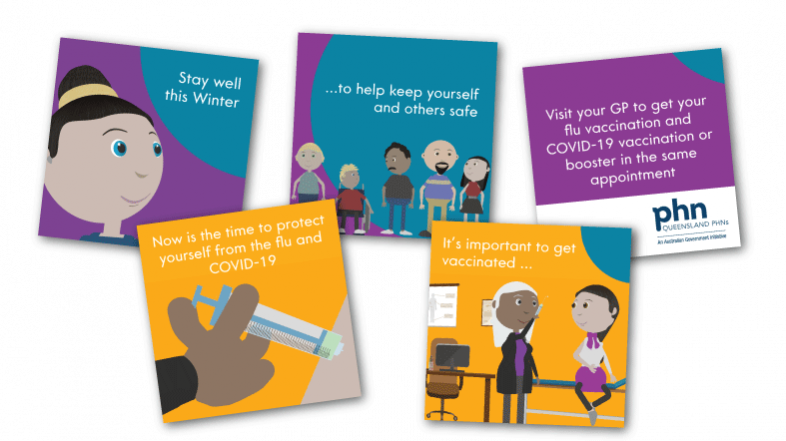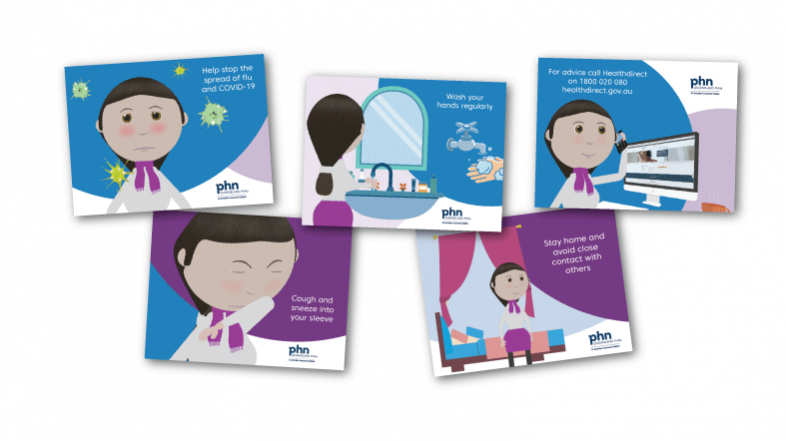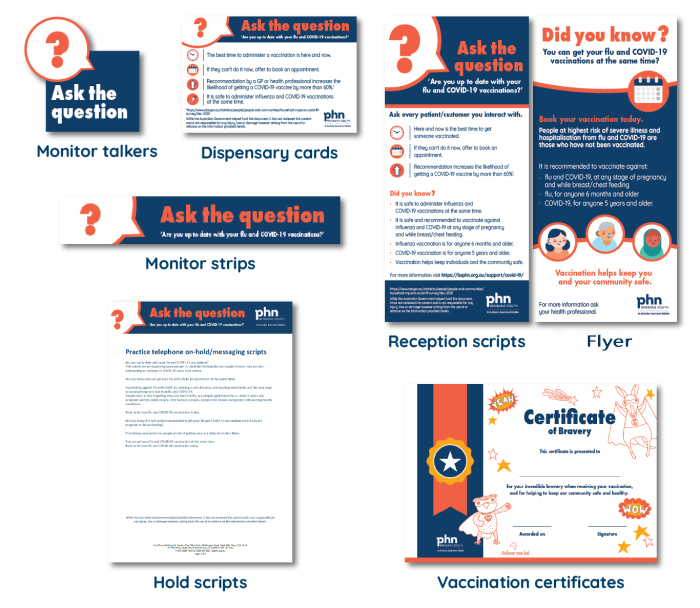
Queensland Health publishes weekly surveillance reports for influenza, Respiratory Syncytial Virus (RSV) and COVID-19 to monitor trends from a number of perspectives, including laboratory confirmed notifications and hospitalisations.
Flu vaccination is recommended for everyone aged six months and older, and are available through GPs and pharmacies*.
Some people have a higher risk of severe illness from flu and are eligible for a free flu vaccine under the National Immunisation Program. They include:
- Aboriginal and Torres Strait Islander people from six months of age
- children from six months to under five years of age
- people aged 6 months and over with certain medical conditions that increase their chance of severe influenza and its complications
- pregnant women
- people aged 65 and over.
ATAGI advice on seasonal influenza vaccines
The Australian Technical Advisory Group on Immunisation (ATAGI) has developed advice for immunisation providers regarding the administration of 2024 seasonal influenza vaccines. Access ATAGI's advice here.
ATAGI has also released a statement on the administration of COVID-19 vaccines in 2024. Read here.
Queensland Health 2024 influenza vaccination advice
In 2024, all Queenslanders aged 6 months and over can receive free influenza vaccination.
For more information, visit the Queensland Health website.
Poster downloads
Australian Government 2024 influenza campaign
The Australian Government Department of Health and Aged Care (DoHAC) has released its 2024 influenza campaign. Find out more on the DoHAC website.
Is your General Practice prepared for the winter season?
Northern Queensland PHN (NQPHN) has developed GP checklists to assist your practice this winter:
- The Winter Strategy Practice Essentials Checklist includes important considerations for your practice for the coming winter season.
-
The Living with COVID-19 Pandemic checklist for General Practice resource is designed to support preparedness and response in General Practice through the changing landscape of living with COVID-19 in our community.
Quality Improvement (QI)
The NQPHN Continuous Quality Improvement Toolkit has been compiled to help practices complete quality improvement (QI) activities. It has been designed to support practices in making easy, measurable and sustainable improvements to provide best practice care for your patients, including during the winter season.
The toolkit includes:
- Proportion of patients aged 65 and over who were immunised against influenza (pg 22)
- Proportion of patients with diabetes who were immunised against influenza (pg 23)
- Proportion of patients with COPD who were immunised against influenza (pg 24).
The toolkit links will take practices to the tools and CAT4 Recipe they will need to undertake the self-directed CQI.
If practices would like to discuss any of these activities further, please contact the NQPHN Primary Care Engagement Team.
RACGP Winter Planning Toolkit
RACGP have also released a Winter Planning Toolkit. The toolkit highlights key priorities and principles of:
- infection prevention and control
- workforce protection and planning
- processes for patient management
- managing the risk of cross infection
- health and wellbeing of staff.
As part of Northern Queensland Primary Health Network’s (NQPHN) Winter Strategy, we have worked with other Queensland PHNs on developing the following resources for general practices to use.
NQPHN would like to thank Murrumbidgee PHN for the initial development of these campaign materials.
Social media tiles
Download the suite of social media tiles at the below links:
Suggested post wording
- Help stop the spread of flu and COVID-19 this winter. Contact us to book your vaccination or booster. #nqphn
- Good hygiene and vaccination help to protect against flu and COVID-19. Call to book a vaccination or booster appointment #nqphn
- Washing your hands regularly helps to protect against the flu and COVID-19. #nqphn
- If you’re sick, stay away from others to keep them safe, even if you have a negative RAT result. #nqphn
- Flu vaccination is recommended for 6 months and older, and COVID-19 vaccination is recommended for 5 years and older. #nqphn
- We can administer your flu and COVID-19 vaccination at the same time. Call to book an appointment. #nqphn
- Even if you have been sick, it is important to get vaccinated against flu and COVID-19. #nqphn
- If you are older or have underlying health conditions, you might be due for another COVID-19 booster. Call us to find out. #nqphn
- Vaccination is an effective way to prevent the spread of flu and COVID-19. Book your vaccination or booster appointment today. #nqphn
- Some people have a higher risk of getting very sick from flu and COVID-19. Book your vaccination or booster appointment today. #nqphn
Vaccination social media tiles

Personal hygiene social media tiles

Vaccination against influenza and COVID-19 are once again important this winter.
At NQPHN, we are supporting GPs, practice nurses, practice receptionists, pharmacists and pharmacy assistants to help with boosting vaccination numbers and:

NQPHN has created a resource pack to encourage health care providers to 'Ask the Question'.
The digital resource pack also contains:

The following clinical information and resources are available to support immunisation providers:
National Hand Hygiene Initiative factsheets
Three NHHI factsheets have been designed to provide information on the importance of hand hygiene for patients and carers, children and carers, and mental health workers.
These new factsheets are available on the Commission’s website, along with other resources, including posters, presentations and videos, here.

Annual vaccination is the most important measure to prevent influenza and its complications. The influenza vaccine is recommended for all individuals aged 6 months and over.
Influenza is a highly contagious viral infection that can cause widespread illness and deaths every year.
Visit the Australian Government Department of Health's website for a full resource collection for the 2024 influenza season, including:
- information for consumers
- advice for vaccination providers
- resources for healthcare settings
- campaign materials.
Queensland Health have developed a Stakeholder Communication Kit for Acute Respiratory Infections (ARIs), including influenza, COVID-19, and RSV.
The toolkit and online in the Queensland Health Asset Library, includes more information and key messages, as well as:
- social media images and suggested copy
- A3 and A4 posters
- web banners in various sizes
- resources for specific audiences, including
- multicultural communities
- people with disability and carers
- First Nations people
- healthcare professionals.
Vaccination experts recommend influenza vaccination for all people aged 6 months and over.
Under the National Immunisation Program, free influenza vaccines are provided to the following groups who are at higher risk of complications from influenza:
- children aged 6 months to less than 5 years
- all Aboriginal and Torres Strait Islander people aged 6 months and over
- people aged 6 months and over with certain medical conditions that increase their chance of severe influenza and its complications
- pregnant women (at any stage during pregnancy)
- people aged 65 years and over.
Free influenza vaccines under the National Immunisation Program are now available. Check with your immunisation provider to find out when they will have the vaccine available and when you can book in to get the vaccine.
Book your appointment to get vaccinated to ensure you have the best protection at the peak of the season (usually June to September). However, it’s never too late to get vaccinated as influenza can spread all year round.
Free influenza vaccines are available from GPs, community health clinics, and eligible pharmacies.
To locate a service in your area, you can search the National Health Services Directory.
If you are not eligible for a free influenza vaccine, you can buy the vaccine from your GP, a pharmacy, or another immunisation provider.
The influenza vaccine and COVID-19 vaccines can be safely given at the same visit.
The best way to protect yourself against getting both infections this winter is to make sure you’ve had your influenza vaccine and are fully vaccinated against COVID-19, including any recommended booster doses.
When you book in for your influenza vaccination, talk to your vaccination provider about whether they can administer both vaccines.
The Australian Immunisation Register records vaccines given to all people in Australia.
Your immunisation provider must report all influenza vaccinations to the Register. This includes some personal information such as your name, date of birth, contact details, and your Medicare card number.
Find out how we manage this data in the Privacy Policy for the Australian Immunisation Register.
The flu is caused by the influenza virus. There are many different strains and they can change every year.
The flu has different complications than the common cold and can lead to other health concerns for those infected including:
More common side effects
- bronchitis
- croup
- pneumonia
- ear infections
Other health complications
- heart and other organ damage
- brain inflammation and brain damage
- death.
The flu is easily spread from person to person. Most infections happen in winter.
- Runny nose or sneezing.
- Cough or sore throat.
- Fever and chills.
- Headache.
- Body aches.
- Vomiting and diarrhoea (more common in children).
Symptoms usually start about one to three days after catching the flu and can last for a week or more. Some people can be mildly affected, while others can become seriously ill.
A common cold is not the same as the flu, although some of the symptoms are similar.
The flu can affect people of all ages.
People at highest risk of being hospitalised with flu are:
- babies
- people more than 65 years old
- Aboriginal and Torres Strait Islander people
- pregnant women
- people with long-term medical conditions
- people who have weakened immune systems
- people who are obese
- people who smoke
- people who haven’t been vaccinated against the flu.
Long-term medical conditions that can lead to you having a serious case of the flu include:
- heart disease
- lung disease
- nervous system conditions like multiple sclerosis
- liver and kidney disease
- diabetes
- blood diseases.
The flu is easily spread and very infectious, and occurs:
- when an infected person coughs or sneezes, and you breathe it in
- through direct contact with fluid from an infected person’s coughs or sneezes
- by touching a contaminated surface with the flu virus on it, and then touching your mouth, eyes, or nose.
The flu spreads easily through families, workplaces, childcare centres, and schools.
If you have the flu, you can help stop the disease spreading by:
- staying away from childcare, school, work or other places where they could spread the infection until you are well
- covering your coughs and sneezes
- washing your hands often.
If you have a health concern one easy way to gain a better understanding is to use the Health Direct Symptom Checker.
Your doctor can diagnose the flu by:
- checking your symptoms
- asking if you’ve been in contact with someone who has the flu
- swabbing your nose or throat or taking a blood sample to test for the virus.
If you have influenza your doctor may be required to notify your state or territory health department.
Mild flu gets better on its own without any treatment.
You can relieve the symptoms by:
- resting – stay home from work
- drinking fluids, particularly water
- taking paracetamol to reduce pain and fever
- using decongestant medicines.
If diagnosed, you may be given medicines which if given early can help shorten how long illness lasts.
Antibiotics should not be used to treat colds or the flu, which are viral — not bacterial — infections.
People with a serious case of the flu may need to go to hospital. Even with treatment, some people with severe flu may die.
People should seek medical advice if you experience:
- difficulty breathing
- shortness of breath
- chest pain or severe abdominal pain
- confusion
- sudden dizziness
- severe vomiting or vomiting that won’t stop.
If you’re getting concerned about your health, talk to your GP.
Call 13 HEALTH (13 43 25 84) for free 24-hour assistance from a registered nurse.
A pharmacist can also help with medications that will aid symptoms like body pain or a cough.
If you’re feeling really unwell, call triple zero (000) for assistance.
Queensland Health has developed an Acute respiratory infections (ARIs) in residential care facilities website to assist the sector over the winter months with viruses that cause acute respiratory infection including influenza, COVID-19, and respiratory syncytial virus (RSV).
- Influenza (flu) vaccine
- Vaccination and Immunisation matters – Queensland Health
- Influenza vaccines FAQs - National Centre for Immunisation Research and Surveillance
- Why does my child need a flu shot? – Sharing Knowledge About Immunisation
- Healthdirect - Flu (influenza)
- Healthdirect - Flu vaccine FAQs
- 2024 influenza vaccination guidelines (Queensland Health)
- Influenza vaccines – FAQs (NCIRS)
- COVID-19 vaccines – FAQs (NCIRS)





